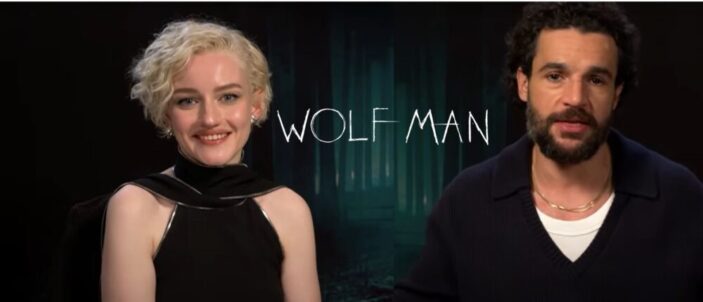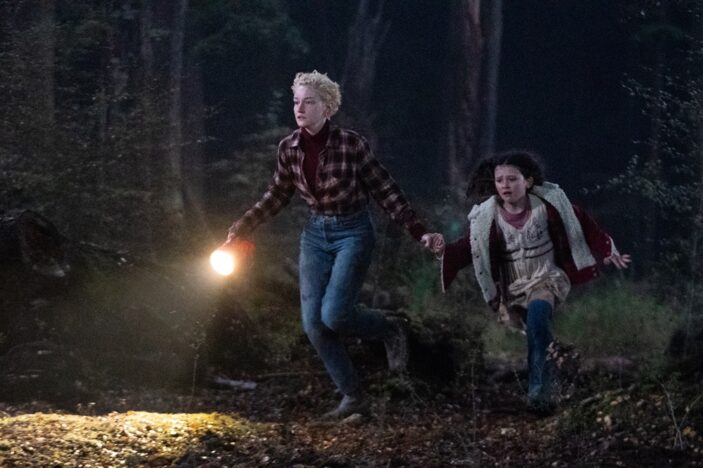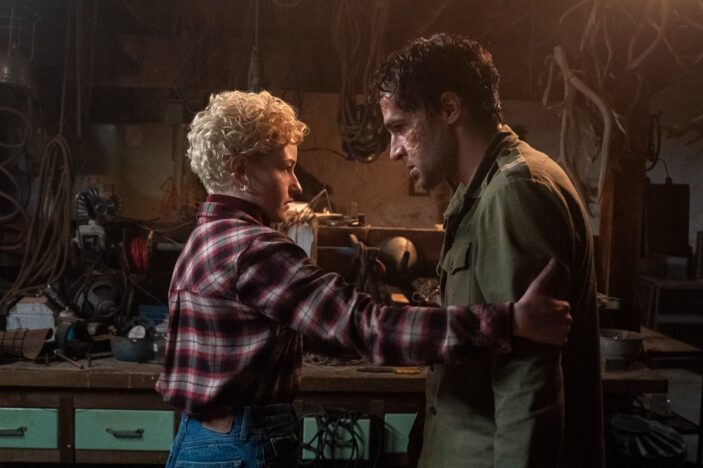
What if someone you loved became something else?
From Blumhouse and visionary writer-director Leigh Whannell, the creators of the chilling modern monster tale The Invisible Man, comes a terrifying new lupine nightmare: Wolf Man.
Christopher Abbott stars as Blake, a San Francisco husband and father, who inherits his remote childhood home in rural Oregon after his own father vanishes and is presumed dead. With his marriage to his high-powered wife, Charlotte (Julia Garner), fraying, Blake persuades Charlotte to take a break from the city and visit the property with their young daughter, Ginger. But as the family approaches the farmhouse in the dead of night, they’re attacked by an unseen animal and, in a desperate escape, barricade themselves inside the home as the creature prowls the perimeter. As the night stretches on, however, Blake begins to behave strangely, transforming into something unrecognizable, and Charlotte will be forced to decide whether the terror within their house is more lethal than the danger without.
Following our interview with Leigh Whannell and co-writer Corbett Tuck (you can read that here), Peter Gray spoke with Abbott and Garner about shaping their unique performances, their experience in genre filmmaking, and how it was for Christopher when dialogue was taken away from him.
Leigh Whannell has such a distinct approach to horror, and I wanted to ask were there any insights that he provided you that helped shaped your performance, and vice versa? Did you bring anything specific to Charlotte that wasn’t on the page?
Julia Garner: I mean, I think there were a few things that he said in the beginning that kind of opened (up) and made it easier for me with the prep. One of the things he always said in the beginning was that it’s about connection, and then losing connection, and then it’s too late.
He wanted to approach (the transformation) like it was almost a disease or an illness that Blake was turning into a werewolf. And because of that, I was like, “Huh, illness, disease, losing, death.” That’s what I thought about. Grief. So I started reading a lot of books on grief and loss, and then I approached (Leigh) and, looking at the script, I remember thinking it was a confirmation of what he said. I wanted to approach this like the seven stages of grief in one night. That kind of opened the door for me, and then I brought that to him.
There’s some really heartbreaking aspects in the film, especially when Charlotte is so desperately trying to connect with Blake, but he can’t respond in a human way, Whether they are physical or emotional characteristics, what was it that you found in either the character of Blake or Christopher as an actor to latch on to to feel that humanity?
Julia Garner: Going back to the seven stages of grief. One of them is desperation. You see that Charlotte got angry at one point in the film, then she’s hopeless, then she’s depressed, and then she’s desperate or delusional. I think desperate comes before acceptance, which is another stage of grief, and (Charlotte) is desperate to be heard. For her husband to hear her. I think there’s something really devastating about that. And also just devastating knowing that the potential of their dream is dead. That would make anyone upset.
You’ve worked on tense projects before. I’m going to shout out Royal Hotel, such a great film. For you, when you’re working with these types of atmospheric narratives, is there a special sauce for you that made it easier to look at something on the page and know how you’ll perform it on set? The scariness can be taken away when filming, but do you find that it’s a genre that becomes easier? Given you’ve had other experiences.
Julia Garner: Nothing’s ever easy if you want it to be really good. It could be the most simple thing. Usually the simplest things are the hardest, surprisingly, but if you want things to be great, it’s never easy. I don’t know how people are going to resonate with my work, or this film, I can’t control that. But the thing that felt different about this was that this actually felt more like an action movie. It was more action than any other (film) I’ve done. I’ve done horror and tense films, and tense TV shows before, but this has felt like an action movie in a weird way. I mean, the amount of running I had to do in this movie was crazy. I’ve never ran so much in my life (laughs).

Regarding the prep you’ve already mentioned, I assume seeing Christopher on set and he’s in his prosthetics, that’s a visceral experience. What does that do to you when you see such incredible makeup and prosthetics? How much does that help you? Or the process of getting into character for that moment of seeing something so inhuman?
Julia Garner: I mean, it makes it easier. It makes the performance better, because it’s more real. There’s nothing better than the feeling that it’s almost reality that you’re capturing on the cameras. You never want to “act” as an actor. It’s my worst nightmare. It makes it easier for that reason.
Christopher, I loved the duality of your performance here. The humanity and the monstrosity. I was wondering, was there a challenge in keeping that humanity as you were transforming?
Christopher Abbott: There was a challenge, but that was part of it. The transformation that happens is sort of in stages. It’s slow. And so while it’s challenging in part, it’s the fun part of the role, really. Especially in the middle where, let’s call it more of a 50/50 of a human and animal, I can play with the levels of that. I just thought that it was one of the more exciting things to do in this movie. And with Leigh, just work on dialing it up or down. How often do you get to that?
Bouncing off that, was there a specific element or aspect of the physicality that you wanted to focus on getting across? Especially emotionally when dialogue is taken away.
Christopher Abbott: Yeah, well I guess in terms of the dialogue, the truth is I watched a lot of animal videos. Not just wolf stuff, but whatever I could find. YouTube has a plethora of anything you want, right? So this idea of how do animals communicate certain things, and the simplification of that, how to make that come across with a mix of human, you know? I don’t remember the specifics of what I did on the day, but I remember there were just a few days where I played with a sound in my brain and think, “I want to say this line.” What I want to say is…but I can’t. So how do you convey it? With your eyes, with your mouth, your body, whatever comes. That was a fun thing to play with.
I don’t know how many times in my career I’ll get asked to play an animal of any kind, right? It’s so unique that you kind of have to do it. You just have to try. There’s a lot of heart to the film (too). It’s a family drama, really, at first, and then it sort of becomes very much a horror and a thriller. And these events are happening in real time, so to be able to do that and have this slow progression of a transformation, and be able to play with all the levels of that sort of transformation…it’s like the coolest kind of challenge. To be that physical and everything. I haven’t gotten to do that before, so I was excited.

I feel like the werewolf myth is so often tied to the ideas of repression and forbidden desires. Was that ever something that came into your approach when playing this character?
Christopher Abbott: The forbidden desires thing, not really in this story. I think it’s the vehicle of the transformation and whether it’s some generational trauma, or the fatherhood thing, or how to protect your young from yourself. It’s the theme of illness that’s here as the relatable communication that runs through it. I know what you’re talking about, but it’s a bit different here.
The bulk of this story takes place over one night. How does that affect your process in tapping into the emotional arc of a character in such a constricted time frame?
Christopher Abbott: Yeah, normally that would be challenging, but because of the transformation and how it takes place in the movie, the transformation helps do that job for me. Everyone talks about how the character changes by the end of the movie, and this is like the clearest, you know what I mean? It’s the clearest possible way of doing that. It goes back to the physical. It’s all there, you know what I mean? It’s just keeping track of the human, the animal, the relationship with the wife and the daughter.
Wolf Man is now screening in Australian theatres.
